Greenwich High School Connecticut Prepares Students For Pro Music Careers
Focusrite in Education's "Expert Guide: How to Fund Your Career Tech Program" shared insights into building, maintaining, and supporting career and technical education (CTE) programs in music technology. We then featured Fort Hayes Metropolitan Education Center to show these insights in action. As part of our continuing series, Focusrite in Education now features another exemplary CTE program.
Greenwich High School's Electronic Music & Audio Engineering program builds on a foundation of musical concepts to teach the practical skills needed for a variety of music industry roles.
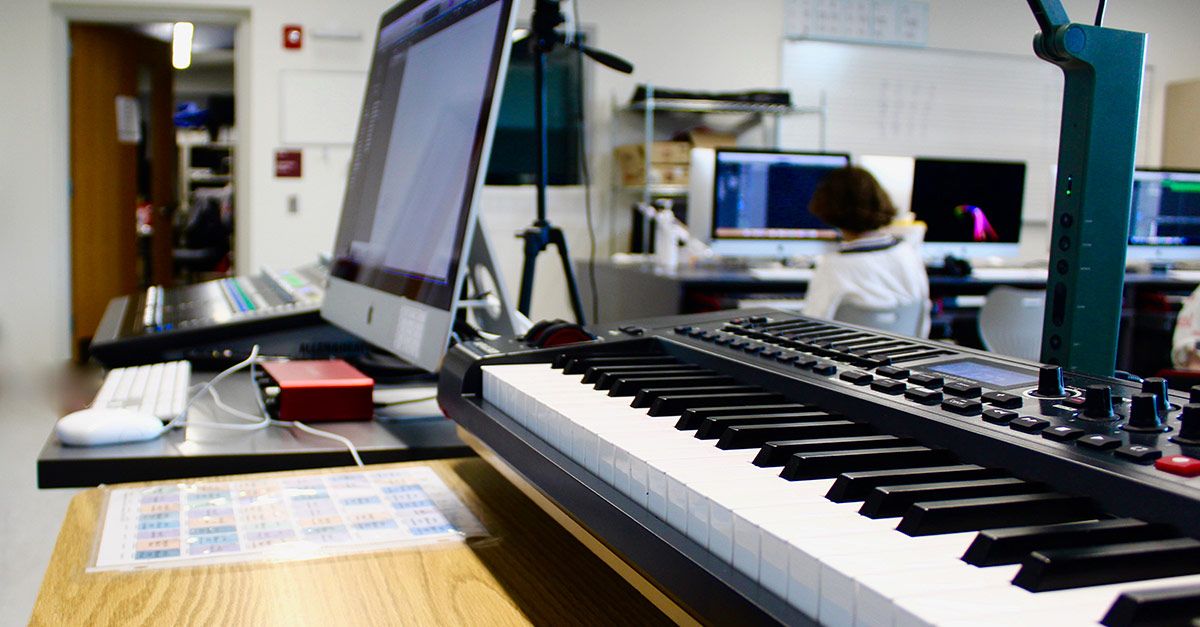
Music CTE At Greenwich
Greenwich High School enables students to create music that speaks to them and prepares them for careers in the creative industries and beyond. The school serves approximately 2,700 students in Connecticut's Greenwich Public Schools district. It also has a long tradition with music technology: one of the country's first electronic music programs was started there in 1969!
The Electronic Music & Audio Engineering program offers four levels of electronic music. Faculty and students take pride in being on the cutting edge of music education opportunities regardless of students' previous experience with music or technology.
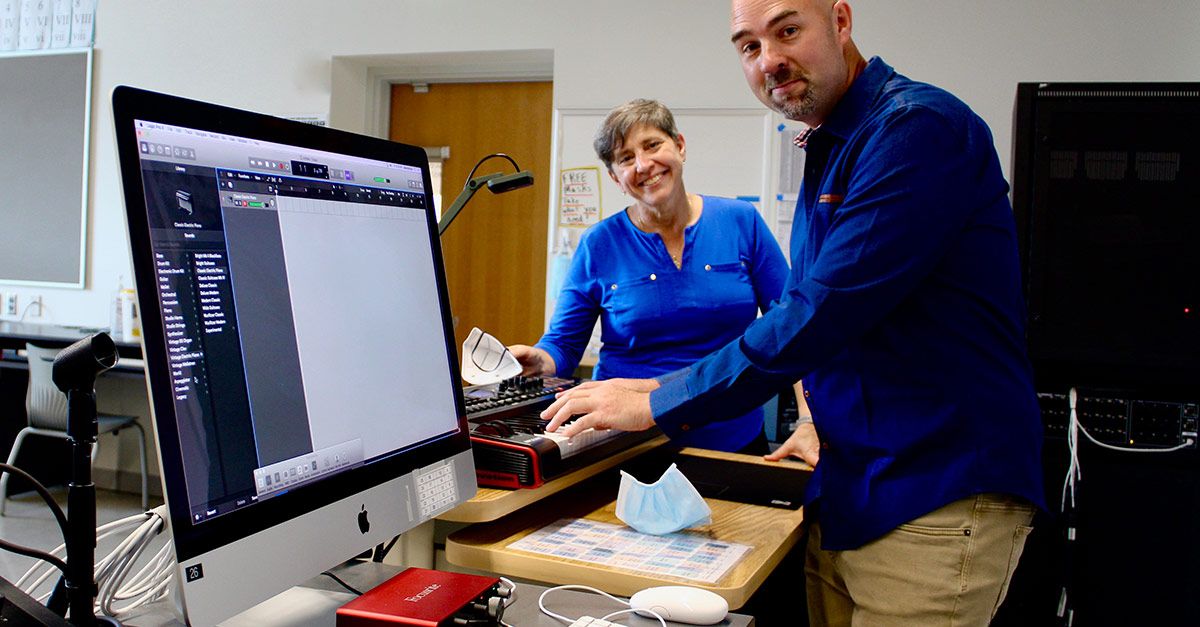
Expert Faculty And Successful Alumni
Barbara Freedman has taught the program since 2001. She also leads professional development workshops around the country and works as a consultant to schools and districts building technology labs and integrating technology into their curriculums. Dr. Freedman was also selected as the 2012 TI:ME Technology Teacher of the Year.
Alumni of the program include associate director of tour marketing for RCA Max Gayle, acclaimed hip hop producer Kenneth “Kenny Beats" Bloom, Emmy-winning composer and producer Rob Mathes, music entrepreneur and manager for Justin Bieber, Ariana Grande, and Demi Lovato Scooter Braun, and manager for groups including Morrissey, Snoop Dogg, Smashing Pumpkins, and Backstreet Boys Peter Katsis.
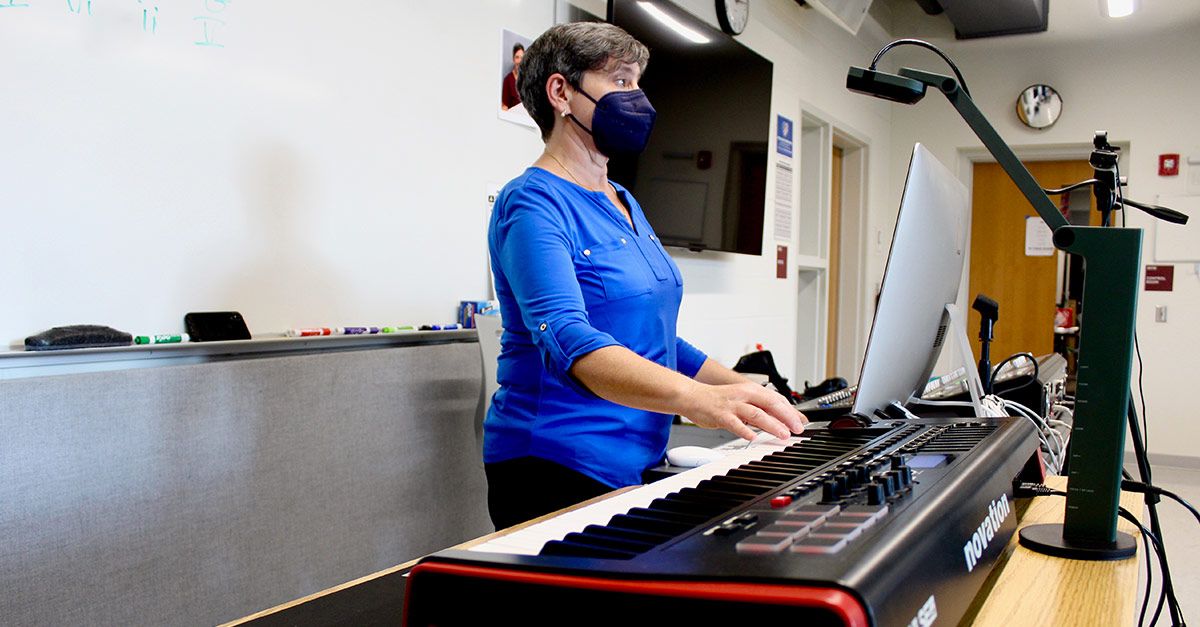 Professional Resources
Professional Resources
The school's recording studio allows students to learn live recording and sound reinforcement. It is outfitted with Avid Pro Tools and a lab with Novation MIDI keyboard controllers as well as a production room and isolation booth set up like a professional workspace.
This combination of advanced facilities, outstanding faculty, and real-world success stories has made electronic music one of the most popular programs at Greenwich High School. More students enroll in the program than the other music programs combined.
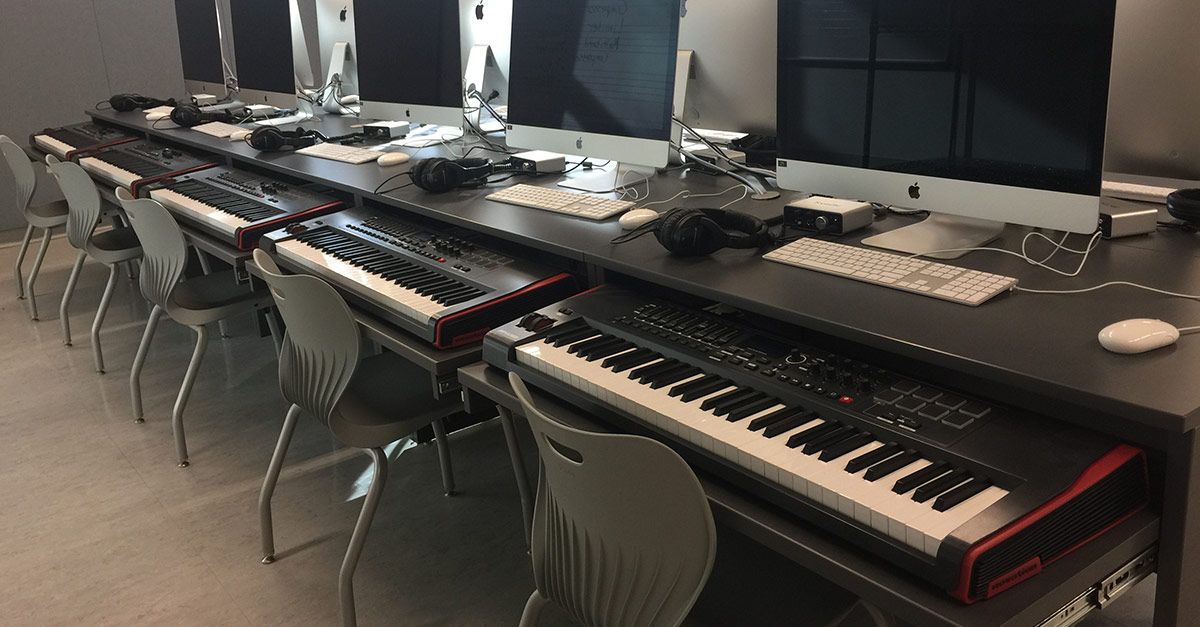 Teaching Composition Through Technology
Teaching Composition Through Technology
Dr. Freedman's motto is “Teach music. The technology will follow." Her music education philosophy centers on the idea that music technology and audio engineering are not separate from traditional musical concepts. Students have to know music theory, reading music, ear training, and other foundational concepts for careers in these fields.
“Teach music. The technology will follow."
The program builds students' musical skills and understanding from the outset. Students create music on the keyboard piano—not pads—because it grounds them in fundamentals. Instead of using the arpeggiator function, students practice and internalize these sounds and ideas on a keyboard.
As Dr. Freedman explains further, “The entire curriculum is about teaching musical concepts, so the assignments and projects steer students toward creating music through concepts like rhythm, chords, bass, melody, form, and structure. If you create an assignment that requires students to use certain things, you need to teach what those things are and then ask the kids to demonstrate their knowledge through creating within certain parameters."
Dr. Freedman also points out this program's uniqueness among other music offerings: students create and produce their own new works from the ground up. “Unlike band, orchestra, and chorus," Dr. Freedman notes, “these students are creating something from nothing." This makes the process challenging, and that's why students receive guidance and encouragement at every step with an emphasis on effort, hard work, and self-growth.
Connecting Music Fundamentals To Professional Competence
While music theory and other concepts might seem abstract, Greenwich's program constantly connects core musical competencies and career training. These fundamentals are not just concepts that might improve their work but also essential career tools for various roles.
As just one specific example, Dr. Freedman points to the importance of ear training:
Lessons like these prepare students for a range of career opportunities:
- Music production
- Composition and arranging
- Sound design
- Video, film, and game sound
- Audio and recording engineering
- Mixing and mastering
- Live sound and acoustical design
- Tour support
- Music business
- Artist representation and management
- Marketing
- Copyright and trademark law
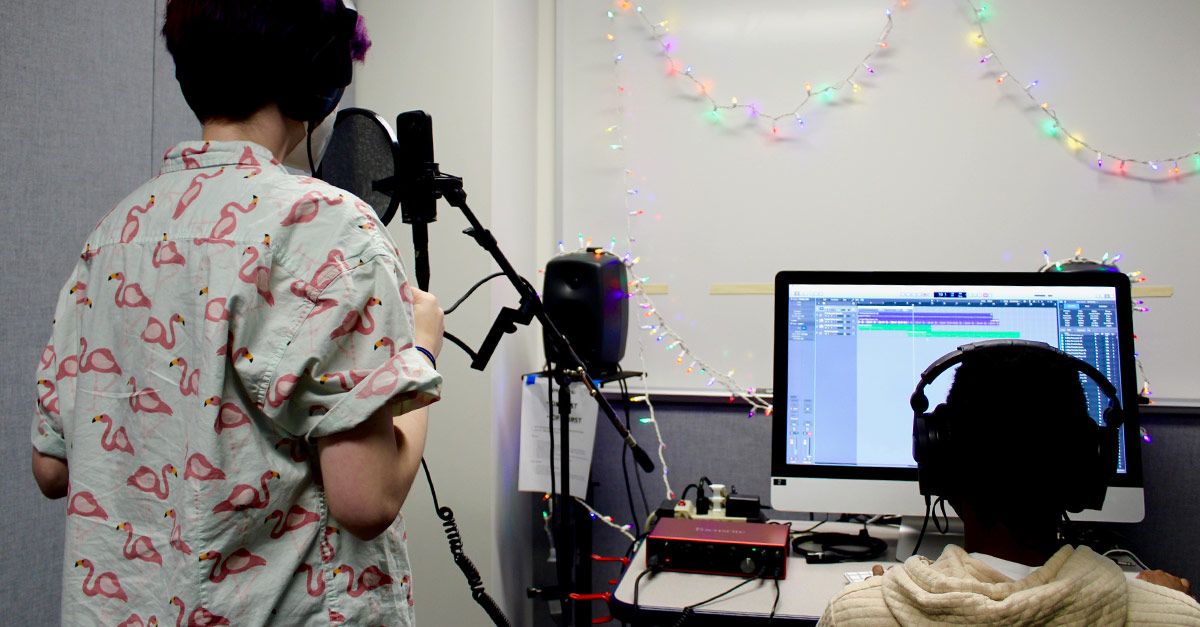 Many students have gone into Artists and Repertoire (“A&R") and management. Others have used their training for major equipment manufacturers, where understanding and sensitivity to every nuance of sound helps create cutting-edge microphones, speakers, and other technology. Some have become audio engineers for major performance halls around the country and even major institutions such as the United Nations. Other alumni have founded successful information and communications technology companies.
Many students have gone into Artists and Repertoire (“A&R") and management. Others have used their training for major equipment manufacturers, where understanding and sensitivity to every nuance of sound helps create cutting-edge microphones, speakers, and other technology. Some have become audio engineers for major performance halls around the country and even major institutions such as the United Nations. Other alumni have founded successful information and communications technology companies.
Outside of these musical and technical skills, as explored in previous case studies, their education provides a range of “soft skills" applicable regardless of their career path. Collaboration, time management, and interpersonal communication are crucial parts of Greenwich students' education.
Dr. Freedman also reminds us that “the business world is looking for creativity, and that's the muscle we're building here." At Greenwich, students become confident in their ability to solve problems and contribute their ideas.
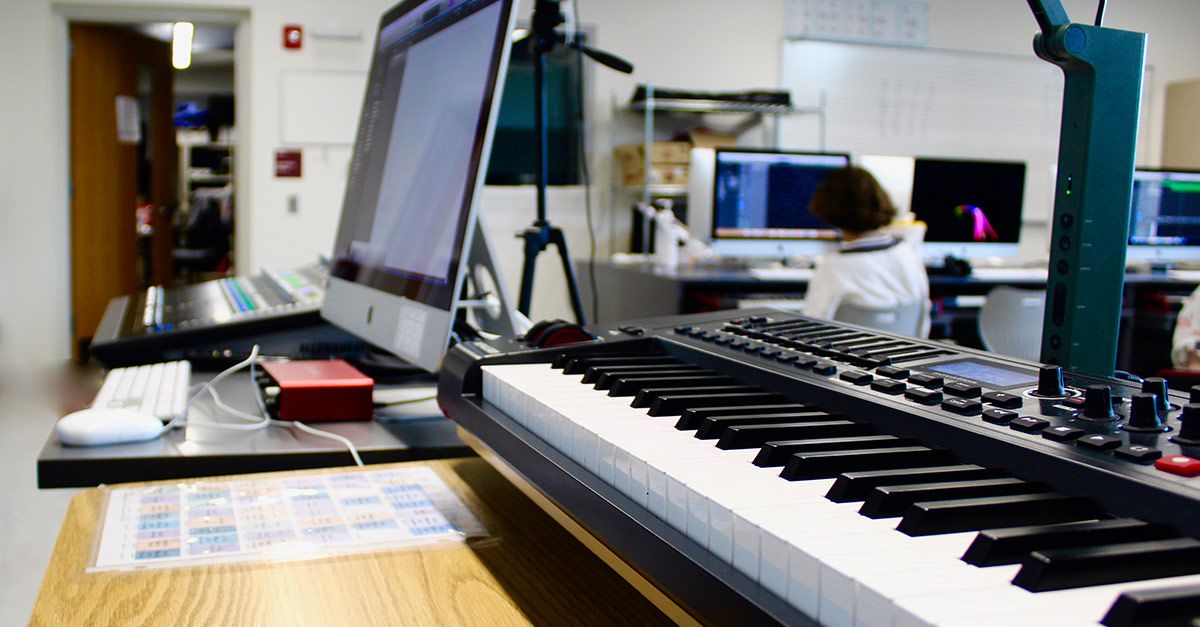 Making It Fun
Making It Fun
For Dr. Freedman, teaching with technology is no different than teaching any instrument. She just tries to remove the complexity of using the tools. This creates an environment where students feel comfortable trying new things and learning new techniques and tools. Rather than emphasizing a perfect end product, the program concentrates on learning by doing and students trying their hardest while using various resources to express themselves.
As students want to do more and have to learn more concepts, she introduces more sophisticated technology. This approach takes advantage of the student's curiosity and desire to improve their work. It presents more advanced concepts and techniques not as steps in a sequence of increasing difficulty but just the next steps to get to what they want.
“If your kids want to make hip hop, even if you don't understand it—or even like it—you still have to immerse yourself in it. What they like matters because that's when they're having fun!"
The program also meets students on their own terms. As Dr. Freedman explains, “Make it cool and teach things they want to learn. If your kids want to make hip hop, even if you don't understand it—or even like it—you still have to immerse yourself in it. What they like matters because that's when they're having fun!" In addition to fulfilling the student's goals, this approach helps generate demand for the program, which allows sustainability. “Kids have to want to take these classes. If I'm not making it interesting, and they don't want to be here, well…"
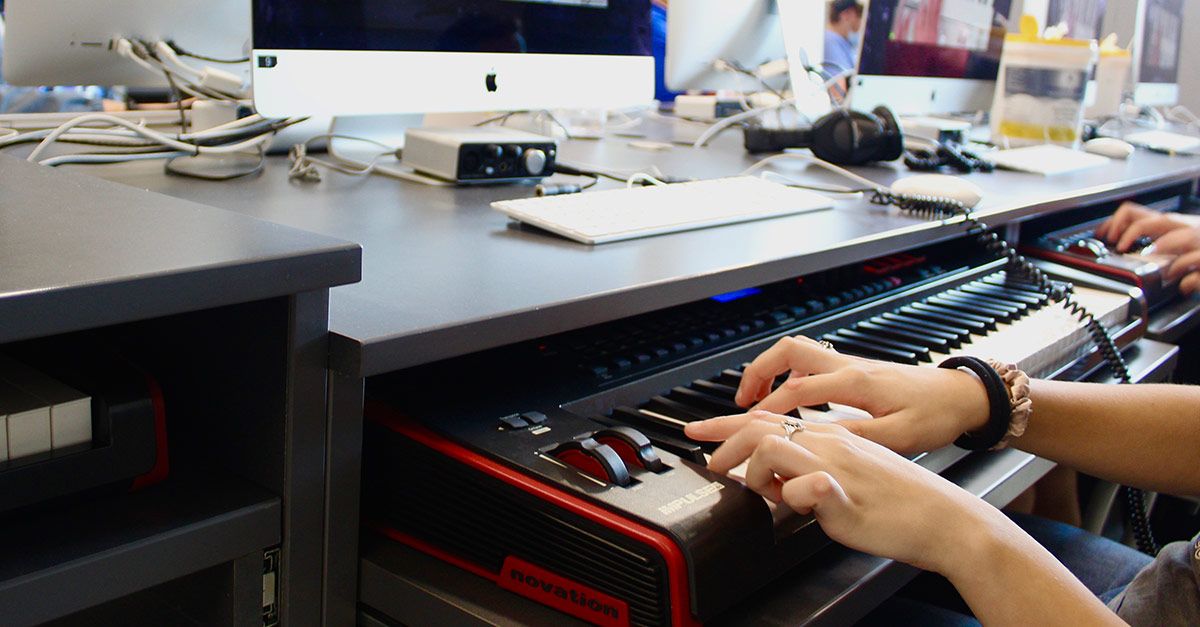
Staying Nimble
Like all programs around the world, the pandemic forced Greenwich to adjust. At first, with the news that students and teachers would not be returning to the building, the focus was on keeping students engaged and assessing their comfort level during a traumatic time. Yet even with the switch to hybrid teaching, many students are still learning online. “Teaching high school students online is not just different from teaching them on site," explains Freedman. “It's different than teaching any other cohort, such as college students, remotely."
In Dr. Freedman's view, pedagogy around a specific instrument is essentially static, but if you change the instrument, the pedagogy has to change. When her district was forced to go online due to the pandemic, the students had to learn a new instrument: online digital audio workstations (DAWs). These tools had many more restrictions, which forced her to adapt further. “Luckily, I have a lot to pull out of my pocket!" In the classroom or online, the program responds to the music students enjoy and the music they want to create while ensuring students receive a solid grounding.
Building Your Toolkit
Dr. Freedman encourages colleagues to build their library of resources to stay nimble. Freedman's book, Teaching Music Through Composition: A Curriculum Using Technology, is intended for people with “no clue" where to start.
She also highlights the volume of informative videos that organizations and educators worldwide post to share their own experiences and best practices. The pandemic has also made many classes and conferences virtual, so the opportunity to learn from others is more accessible. It's easy to lose sight of this intuitive yet powerful advice given the challenges facing educators. Yet even if you can't be in the same actual room as students and colleagues, you are not alone.
Finally, she underscores the importance of building and reaching out to your professional network. Whether through professional online forums or Facebook, even if the people you know haven't encountered the specific issue you face, two heads are often better than one.
Greenwich High School's Music and Audio Engineering Program has implemented Focusrite's RedNet Audio-over-IP hardware and platform — an industry standard. Learn more about Focusrite RedNet in education, and how it prepares students for careers in music and audio here.
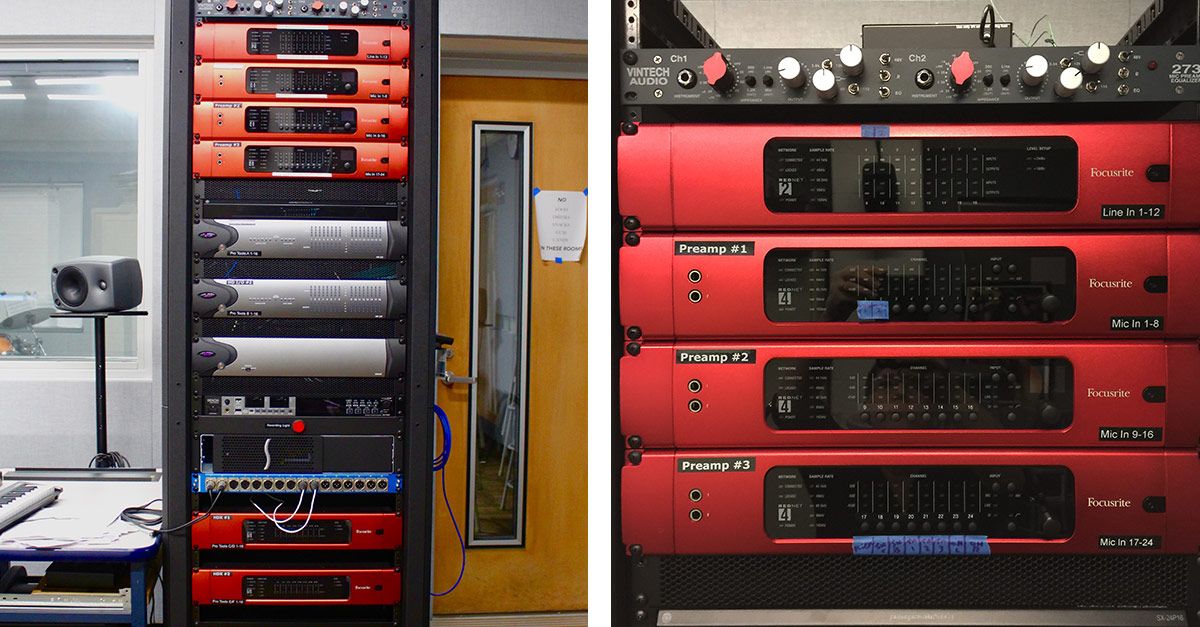
Click here to download case study as PDF
